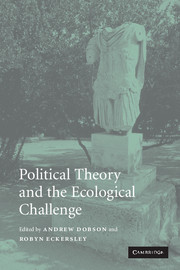11 - Representation
Published online by Cambridge University Press: 06 July 2010
Summary
‘Political theory’ is a wide and diverse body of work; in this book's title, it comes across as inert, the receptor, the thing that is acted upon. The active ingredient, the ‘challenge’, is ecological. There is, of course, no given, bounded body of political theory to be acted upon, but rather a shifting set of arguments and assumptions. And the ecological challenge is in fact many challenges – to conventional views of the state, social justice, democracy, progress, individualism and more. Which of a range of possibilities to pick when it comes to ‘representation’? How to represent the problem of representation?
Political representation is normally discussed in terms of how accurately elected representatives reflect the interests of voters. In this chapter, I argue that representation happens in many more places than just elected legislatures, and in many more ways than the accurate capturing of human interests. I start from the view that representative claims are made by a great variety of political actors, and that representation involves the active portrayal of constituencies rather than simple reflection of them. From that base, it quickly becomes clear that adding some ‘proxy’ representatives of nature into conventional legislatures (Dobson 1996), for example, is just one part of the ecological challenge, and probably not the most important part.
- Type
- Chapter
- Information
- Political Theory and the Ecological Challenge , pp. 183 - 199Publisher: Cambridge University PressPrint publication year: 2006
References
- 1
- Cited by



